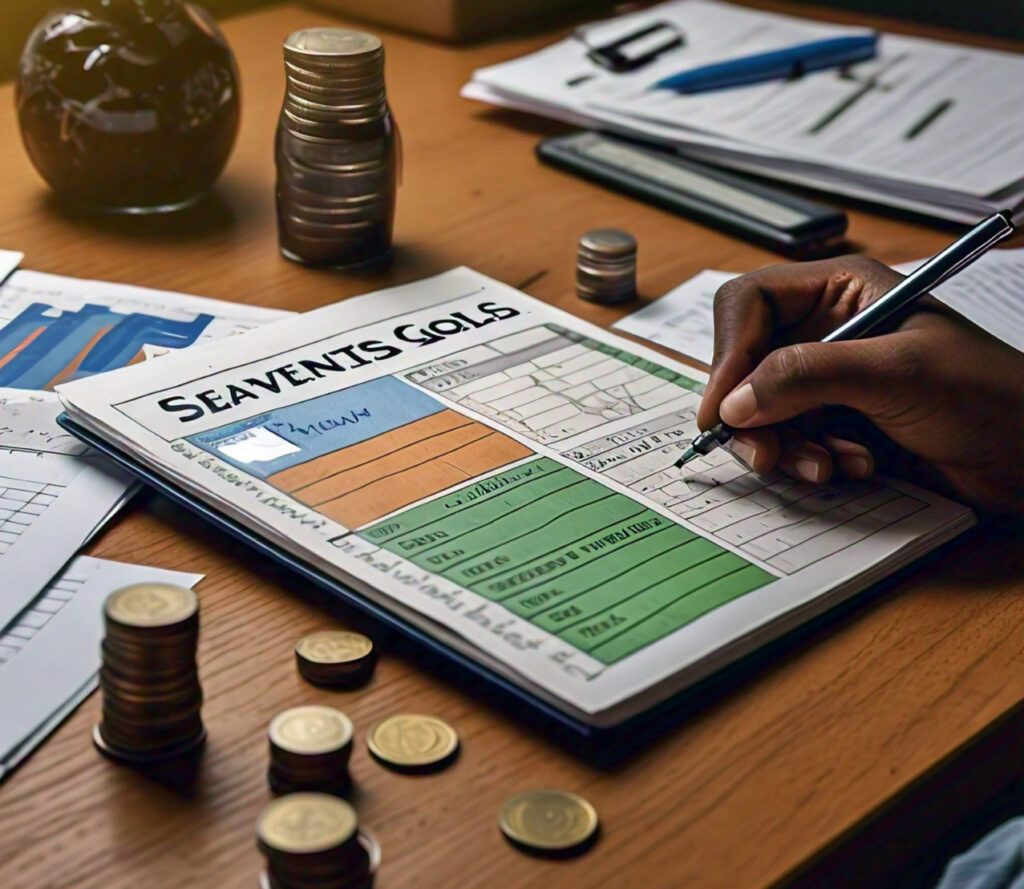How to Make the Right Choice Between Saving and Paying Off Your Debts
Saving money and paying off debts are a few of the most frequent and intricate personal finance questions. Of course, these are both integral parts of financial health, but which to focus on greatly affects your financial future. This article will weigh against each approach and help you make a balanced decision depending on your particularfinancial situation.

In the section below, we will discuss how decisions in this regard are made, ways of saving and repaying debt, and how to find a balance between these two. Whether one is embarking on a journey with finances or just wants to optimise a current strategy, this guide will provide insights into reaching one’s goals.
Understanding the Importance of Both Saving and Debt Repayment
Before we discuss saving versus paying off debt, let’s consider why both might be important to living a healthy financial life.
The Power of Saving
Saving money does a number of very important things:
- Emergency Fund: Savings provide you with a financial buffer against sudden expenses or loss of income.
- Future Goals: Savings help you make long-term financial goals, such as buying into your own home, starting your business, or retiring comfortably.
- Compound Interest: This is the interest that builds upon itself when one saves and invests their money, therefore growing over time.
- Peace of Mind: Savings reduce financial stress, giving one a sense of security.
The Impact of Debt
On the other hand, management and pay-off of debt is equally important:
- Interest Costs: Debt, especially high-interest debt, is expensive over time and reduces financial resources.
- Credit Score: Current levels of debt and past payment performance heavily affect credit ratings, which then become important for future borrowing.
- Freedom over Finances: Debt-free status provides greater flexibility over financial choices and options in life.
- **Mental Well-being: Debt can be one of those major causes of stress and anxiety that most people endure every day of their lives.
The question of saving or debt repayment is a personal one, and it involves a number of other factors, such as:
Interest Rates
Compare the interest rates of your debts with potential returns on your savings:
- If the interest rate for the debt is greater than what you could gain on savings or investments, paying debt is normally an awful lot superior finance option that makes much more sense.
Examples include credit card debt, where you pay 18% to carry it; paying that off gives you a surefire 18% return, which is hard to beat through most savings or investment vehicles.
Types of Debt
Not all debt is created equal:
High-interest debt – such as credit card debt – should generally be prioritized over lower-interest debt, such as mortgages or student loans.
Some forms of debt, such as mortgages, may have tax benefits that will impact the overall cost of your debt.

Emergency Fund Status
Consider your current savings:
- If you have no emergency fund, building one should be very high in your priority list to avoid issuance of debt when unexpected expenses arise.
- Accumulate at least 3-6 months of your living expenses in your emergency fund.
Employer Matching on Retirement Contributions
If your employer offers matching contributions in some sort of retirement account:
-Contribute enough to take full advantage of the company match, as this is essentially free money.
- This may mean balancing debt repayment with retirement savings.
Job Security and Income Stability
Your job situation may also influence your decision:
If your job or income is not secure, you will want more money in savings. If general economic conditions are shaky, liquid savings become even more vital.
Emotional Considerations
Don’t underestimate the psychological issues involved:
- Some feel more secure if they have some savings in the bank, even if they have debt.
- Others find debt to be a psychological burden and want the security of reducing it.
Means of Saving Effectively
If you decide to focus on or include saving in your financial strategy, the following are some ways of optimizing your savings:
Make Savings Automatic
Set up automatic transfers from your checking account to a savings account:
- This type of “pay yourself first” approach ensures that you can save before you are able to spend.
- Start with a small amount and gradually increase the amount as you adjust to your new budget.
Choose the Right Savings Vehicle
The type of savings vehicle you choose may depend on your savings goal. For example:
- For short-term goals and building an emergency fund, high-yield savings accounts or money market accounts work well.
Consider investment options like index funds or retirement accounts, including 401(k)s and IRAs, for long-term goals.
Cut Unnecessary Expenses
Go through your spending and cut on areas you can easily do without:
- Cancel unused subscriptions or memberships.
- Find cheaper alternatives to ongoing expenses.
- Go through a “no-spend” challenge to give your savings rate a temporary boost.
Increase Your Income
Find avenues where you can earn extra money to funnel directly into savings:
Ask for a raise at work.
Engage in self-enterprise or take on a part-time job.
Sell things you no longer need.
Put Windfalls to Work
When you come into extra money (tax refund, bonus, gift):
Try not to spend all that money.
Put a substantial portion if not all of the money toward your savings goal.
Paying off Debt Effectively
If paying off debt is more important to you than building an emergency fund, or you want to balance paying down debt and saving money, try these approaches:
Debt Avalanche Method
Pay the highest interest rates first among debts:
Pay minimum on all debts
Extra money to be spent on the debt with the highest interest rate
After this is paid, move into the next highest rate
Debt Snowball Method
Pay your smallest debts first:
Doesn’t take long for quick wins, will help motivate.
Start paying with the smallest debt, without considering the interest rate.
Roll that payment into the next smallest debt as each is paid off.
### Consolidate Your Debts
Consider consolidating multiple debts into one:
This can simplify your payments and possibly lower your overall interest rate.
Options include balance transfer credit cards or personal loans.
### Negotiate with Creditors
Don’t be afraid to ask for better terms:
Convince the credit card companies to reduce the rate of interest
If the debt burden is too much to handle, ask if there is any hardship program available or if a debt settlement can be offered.
The Debt Repayment Plan
Create a debt repayment plan in tabular format for your roadmap to a debt-free life:
Fill in the table with a realistic timeline for the repayment of each debt.
Keep track of your progress once a week for motivation.
Finding the Right Balance: The Hybrid Approach
For most people, the best strategy is some combination of saving and debt repayment. Here’s how to achieve a balance:
Build a Starter Emergency Fund
Before you start aggressively paying off debt, save a small emergency fund:
- $1,000 or one month’s expenses is a good target to shoot for.
- This will help prevent you from having to build even more debt when tiny emergencies arise.
Capture Employer Matching
When possible, contribute to an employer-sponsored retirement plan enough to capture the full company match:
- This makes sure that you are not leaving free money on the table.
Tackle High-Interest Debt
Focus on being debt-free, especially in credit cards:
- The interest rate saved by paying this debt often outstrips potential investment returns.
Simultaneously Save and Pay Debt
If the high-interest debt is under control:
- Divide your extra cash between saving and paying off lower-interest debt.
- The exact division depends upon your goals and risk tolerance.
Reassess Regularly
Your financial situation and goals may evolve over time, so:
- Rebalance every few months.
- Change the balance between saving and paying off debt as needed.
The Psychological Dynamic of Saving versus Paying Off Debt
Saving versus paying off debt is not a number issue; there is actual psychological weight to each choice:
Savings Security
Savings can provide a level of security and comfort:
- Knowing a financial cushion is there reduces stress.
- It can make you feel more confident in making calculated risks, say changing careers.
Freedom from Debt
Debt repaid is amazingly liberating in that:
It takes away the psychological burden of owing money.
Freedom from debt can give a good confidence boost and motivation to achieve success in other spheres of life.
Which One Motivates You More?
Some people get more excited about seeing savings grow.
Others find the progress of debt repayment more rewarding.
Role of Financial Education
Learning about personal finance will indeed help change your mindset:
Knowing things such as compound interest may make the act of saving more appealing.
Knowing how much you actually pay in interest may be a greater motivator to pay down debt sooner.
Special Considerations at Different Life Stages
Your approach to saving versus paying off debt may vary depending on your life stage:
Young Adults
For those just starting their financial journey:
- Focus on building good financial habits.
- Start an emergency fund and contribute to retirement accounts early.
- Avoid accumulating high-interest debt.
Mid-Career Individuals
Those in their prime earning years might:
- Aggressively pay down existing debts.
- Ramp up retirement savings.
- Balance between short-term savings goals and long-term financial security.
Approaching Retirement
As retirement is in sight:
- Pay off all debts, including mortgages.
- Contribute most aggressively to retirement accounts.
- You should have a huge amount for emergencies during retirement.
Economic Influence
It can be influenced by external economic factors:
During Economic Downturn
During times of economic uncertainty:
- You are in more desperate need of intensive savings.
- Your chances of losing your job and income could become more frequent, in which case an emergency fund is required.
Low-Interest-Rate Environment
When Interest Rates Are Low:
- The cost of carrying certain types of debt-such as mortgages-may be lower.
- But the returns on savings accounts may also be lower, which could make paying off debt more attractive.
Periods of Inflation
During high inflationary periods:
- The real value of your debt decreases over time.
- Your savings decrease in purchasing power, so it is important to seek out investments that outpace inflation.
Conclusion
It’s very seldom an either-or decision between saving and debt repayment. Each plays a key role in your financial health and future security. The correct strategy depends on your individual financial circumstances, goals, and personal preferences.
Take away these important points:
- Take stock of your current financial situation including types of debt, interest rates, and any existing savings.
- Prioritize building basic emergency fund and capturing employer retirement matches.
- Pay high-interest debt without completely abandoning saving.
- Find a balanced approach to work toward both saving and debt repayment.
- Periodically reassess your plan for any changes in your financial situation and its goals.
Of course, the ultimate goal should be a permanent, ongoing financial structure for security, alleviation of stress, and making one closer to goals, but instead of trying to find that, take the most important step: take action. It should be more concentrated on saving, aggressively paying down debt, or somewhere in between, finding a middle ground between those two.
Assess your current financial situation today, and set realistic and specific goals. Remember that even small steps taken consistently will add up to significant improvement in the long term. It is very plausible to have more than enough savings, be debt-free as well, and with a couple of years of patience, serious discipline, and properly thought-out planning on the road to a secure and prosperous financial future.






